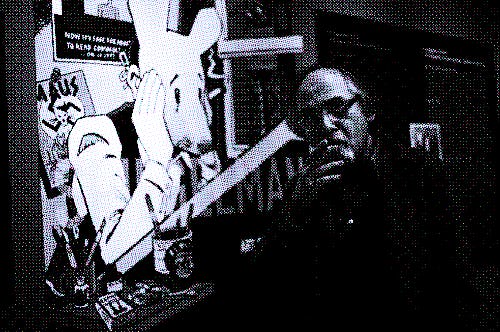A Tennessee school board just banned Maus
Banning one of the most famous Holocaust educational works of all time is spawned from the same garbage attacks conservatives used against critical race theory.

In the end, there was no dissent. By a unanimous vote, all 10 members of Tennessee’s McMinn Country school board voted in favor of removing Art Spiegelman’s near-universally acclaimed memoir, Maus — the only graphic novel to win a Pulitzer Prize — from the district’s 8th grade curriculum.
While the impetus to ban Maus was ostensibly predicated on Spiegelman’s use of vulgarity and nudity to depict his Polish Jewish father’s experience in during World War II — including his having survived the infamous Nazi death camp, Auschwitz — and the intergenerational trauma thereof, minutes from the board’s Jan. 10 debate suggest a broader narrative at play here. Worries that tweens in the year 2022 might be irrevocably harmed by reading “eight curse words and the [nude] picture of the woman” drawn by Spiegelman might be sincere, but belies the context in which this debate takes place — one in which reactionary politicians in multiple levels of state, local, and federal government are purging their communities of vital educational resources based on superficial, and not coincidentally largely right-wing, ideological objections.
“The values of the county are understood,” Lee Parkison, the district’s director of schools, explained at the meeting’s onset, before a series of teachers valiantly tried explaining to the board how the book — famous in part for its visual depictions of different Holocaust-associated nationalities and ethnicities as various animal species — fits into their 8th grade curriculum, and how removing it would necessarily require an overhaul of the entire educational module.
“I may be wrong, but this guy that created the artwork used to do the graphics for Playboy,” board member Tony Allman stressed. “You can look at his history, and we’re letting him do graphics in books for students in elementary school.” (Incidentally, Allman’s objections would also ban other Playboy-tainted degenerates such as Roald Dahl, Ray Bradbury, Isaac Asimov, and Gabriel Garcia Marquez, each of whom also published with the magazine.) In regards to the book’s depiction of the graphic violence that occurred during the Holocaust, as well as Spiegelman’s mother’s post-Holocaust suicide, Allman mused, “Why does the educational system promote this kind of stuff?”
“It is not wise or healthy,” he added.
Cloaked, then, in the language of “age appropriateness” and pearl-clutching concern that a stylized but unflinching depiction of the Holocaust might somehow be too much for 8th graders who are bombarded by decidedly less educationally valid forms of sex and violence every time they check TikTok or Instagram, the board voted to strike one of the most significant and impactful accountings of the Holocaust from its curriculum. It was, in effect, a means to de-fang and then hide away a vital piece of art, history, and literature — all in the name of comfort and civility for the status quo.
Of course, this doesn’t happen in a vacuum. It is, in no small part, a continuation of the larger right-wing effort to excise, neutralize, and then cauterize the educational system in its favor. It’s the inevitable outcome of the nonsensical furor over “critical race theory” promoted by self-proclaimed free speech crusaders and opportunistic moral guardians, whose objections seem to ultimately boil down to not liking it when people learn anything that might make white people uncomfortable.
What makes the McMinn County decision so resonant is not simply that it’s one of the most egregious instances of moral panic overreach in recent memory, but that the subject matter is, itself, the perfect ironic encapsulation of what makes the entire enterprise of conservative thought-policing so insidious to begin with. The fact that a school board banned a book that covers the 20th century’s most infamous example of book-banning (and burning) — both in the name of fighting “degeneracy” — was not lost on many, including author Neil Gaiman, who noted that “there’s only one kind of people who would vote to ban Maus, whatever they are calling themselves these days.”
Speaking with CNN, Spiegelman himself stressed the absurdity of the situation, telling the network, “Dammit, I can’t believe the word ‘damn’ would get the book jettisoned out of schools on its own, but that’s really where the genuine focus seemed to be.”
“I think [the school board is] so myopic in their focus and they’re so afraid of what’s implied and having to defend the decision to teach Maus as part of the curriculum that it led to this daffily myopic response,” he continued.
Myopic or not, Spiegelman seemed all too aware of the broader trend here. “[Banning books] has the breath of autocracy and fascism about it,” the avowed First Amendment absolutist noted. “I think of it as a harbinger of things to come.”
Spiegelman’s warning of the dangers inherent in this type of censorship were delivered, ironically enough, on Holocaust Remembrance Day.